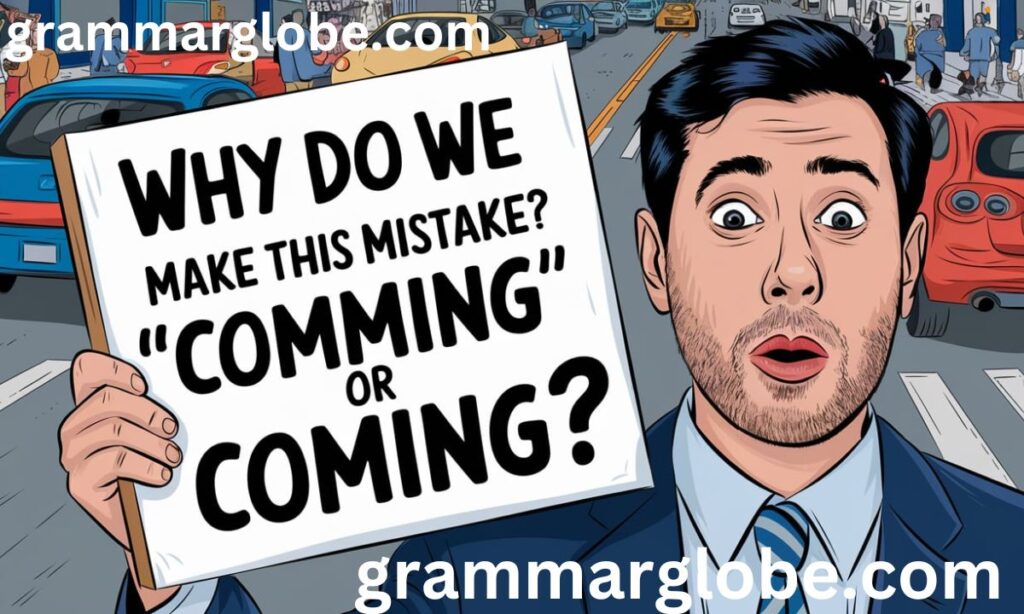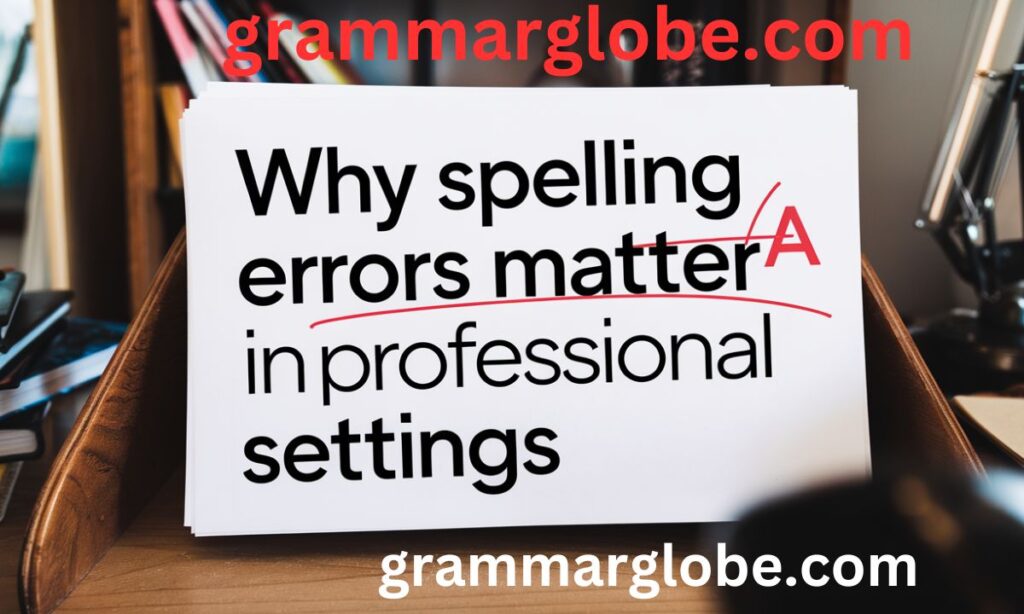English is a fascinating yet perplexing language, full of rules, exceptions, and inconsistencies. It’s no wonder even native speakers find themselves stumbling over certain words. One common error is the mix-up between “comming” and “coming.”
This misspelling might seem trivial, but it highlights the importance of understanding spelling rules. Why does this error occur? How can we avoid it? Most importantly, what does it reveal about our approach to writing?
In this article, we’ll dive deep into the distinction between “comming” and “coming,” uncover the reasons behind common spelling mistakes, and offer tips for improving your writing skills.
You May Read: Excel or Accel: What is the Correct Spelling?
Understanding the Difference: “Comming” vs. “Coming”
At first glance, “comming” and “coming” might appear to be almost identical, but there’s a key distinction between the two. Understanding this difference is crucial for ensuring your writing is both clear and professional.
- “Coming”: This is the correct spelling. It’s the present participle of the verb “come”, which refers to approaching or arriving at a location, time, or event. It’s used in various contexts, from everyday speech to formal writing. For example:
“He is coming to the meeting later today.”
- “Comming”: This is an incorrect spelling. While it’s easy to slip into this form when typing quickly, it does not follow the rules of English spelling. The addition of an extra “m” is unnecessary and incorrect.
Understanding why “coming” is correct requires a basic understanding of English spelling rules, specifically how suffixes like “-ing” interact with base words.

Why “Comming” Is Incorrect
The confusion between “comming” and “coming” is a common issue in English, particularly for those learning the language. This mistake often arises due to misunderstandings of specific spelling rules, including consonant doubling and the silent “e” rule.
Consonant Doubling Rule
In English, certain verbs double the final consonant when they take a suffix like “-ing.” However, this only occurs under specific conditions:
- The word ends in a single consonant.
- The preceding vowel is short.
- The final syllable is stressed.
For example:
- “Run” becomes “running” because the final consonant “n” is doubled.
- “Sit” becomes “sitting” because of the same rule.
Doubling the final consonant before adding a suffix like “-ing” occurs under specific conditions:
- The word ends in a single consonant.
- The preceding vowel is short.
- The final syllable is stressed.
Examples of Correct Doubling:
| Base Word | With “-ing” | Reason for Doubling |
|---|---|---|
| Run | Running | Short vowel sound, single consonant. |
| Begin | Beginning | Last syllable stressed. |
| Stop | Stopping | Ends in a single consonant after a short vowel. |
Examples Without Doubling:
| Base Word | With “-ing” | Why No Doubling? |
|---|---|---|
| Happen | Happening | Stress is on the first syllable. |
| Meet | Meeting | Contains a long vowel sound. |
| Listen | Listening | Ends in two consonants, so no doubling is needed. |
However, “come” does not meet these conditions. It ends with an “e,” not a consonant, so there is no need to double the “m” before adding the suffix “-ing.”
The Silent “E” Rule
The silent “e” rule is another key reason why “comming” is incorrect. When adding a suffix starting with a vowel (like “-ing”) to a word that ends in a silent “e,” the silent “e” is dropped. This rule helps maintain the flow of the word and prevents unnecessary letters.
For example:
- “Love” becomes “loving” after the silent “e” is dropped.
- “Make” becomes “making” after dropping the “e.”
- “Come” becomes “coming” after the silent “e” is dropped.
By following this rule, you get the correct form “coming” instead of “coming.”
Examples of the Silent “E” Rule:
| Base Word | Transformed Word |
|---|---|
| Love | Loving |
| Move | Moving |
| Bake | Baking |
| Come | Coming |
By applying this rule, “comming” becomes “coming,” which is the correct spelling.
Scenario Example: The Incorrect Use of “Comming”
Let’s consider an example where “comming” is used incorrectly. Imagine you’re sending a professional email to a colleague:
“Thank you for comming to the office this morning. I look forward to our meeting later today.”
While the message may still be understood, the misspelling of “comming” creates a noticeable error. Such mistakes can undermine your professionalism and make your writing seem rushed or careless. This is especially problematic in business or academic communication, where attention to detail is crucial.
The Correct Use: “Coming”
Now, let’s correct that email and ensure proper spelling. The sentence should read:
“Thank you for coming to the office this morning. I look forward to our meeting later today.”
Using “coming” instead of “comming” in this context makes the email look polished, professional, and clear. Proper spelling enhances the readability and credibility of your writing.
Why Do We Make This Mistake?
The mistake of using “comming” instead of “coming” can occur for several reasons. Let’s examine some of the common causes behind this error:
- Overgeneralizing Spelling Rules
English speakers, especially those learning the language, may overgeneralize the consonant doubling rule and incorrectly apply it to words like “come.” This is particularly common when writing quickly or without paying full attention. - Phonetic Confusion
The pronunciation of “come” may lead some people to think that the word requires doubling the “m.” Since we pronounce it as “cuhm,” it may sound like “comming” is the correct form. However, English spelling does not always match its pronunciation, so it’s important to follow the rules. - Typographical Errors
In the age of digital communication, typing errors are inevitable. Sometimes, people mistakenly type an extra “m” when quickly typing the word “coming”. This is a simple mistake that can be avoided with careful proofreading. - Lack of Knowledge of Spelling Patterns
Some people may not be familiar with specific spelling rules, such as the silent “e” rule or consonant doubling. This lack of knowledge can result in frequent spelling errors, especially when it comes to irregular words like “come.”

Common Spelling Errors and How to Avoid Them
The “comming” error is just one example of a common spelling mistake in English. Here are a few other frequent spelling errors and tips on how to avoid them:
| Common Error | Correct Spelling | How to Avoid It |
|---|---|---|
| Definately | Definitely | Remember the “finite” part of “definite.” |
| Seperate | Separate | Mnemonic: “A rat” is in “separate.” |
| Recieve | Receive | Follow the rule: “I before E, except after C.” |
| Occured | Occurred | Double both the “r” and the “c.” |
| Alot | A lot | Always write it as two separate words. |
By familiarizing yourself with common mistakes and practicing your spelling, you can significantly reduce errors and improve your writing quality.
How Writing Tools Can Help
In today’s digital world, there are many writing tools available to help writers identify and correct spelling errors. Two of the most popular tools for spelling and grammar checking are Grammarly and ProWritingAid.
Grammarly
Grammarly is a widely used writing assistant that provides real-time corrections for spelling, grammar, and punctuation errors. It’s especially useful for catching simple mistakes like “comming” and suggesting the correct form “coming.”
Features of Grammarly:
- Real-time spelling and grammar checks.
- Suggestions for sentence structure and clarity.
- Integration with web browsers, Microsoft Word, and Google Docs.
- Mobile apps for writing on the go.
ProWritingAid
ProWritingAid is another excellent tool for writers, particularly for those looking to improve their overall writing style. It not only detects spelling errors but also helps writers refine their sentence structure and vocabulary.
Features of ProWritingAid:
- Grammar, style, and punctuation checks.
- Reports on sentence structure and readability.
- Integration with various writing platforms, including Word and Google Docs.
Both tools can help you catch spelling mistakes, improve your writing, and ensure your content is polished and professional.

Examples of “Coming” in Different Contexts
To reinforce the correct usage of “coming,” here are a few examples of how it can be used in different contexts:
In a Business Email
“The team is coming together nicely, and we’re excited to share our progress with you during the presentation.”
a Motivational Speech
“You’re coming closer to achieving your goals every day. Keep pushing forward!”
In Casual Conversation
“Are you coming to the party this weekend? It’s going to be a blast!”
In Literature
“As the storm clouds were coming, the villagers hurried to their homes.”
These examples show that “coming” can be used in both formal and informal contexts. The key takeaway is that correct spelling is essential for effective communication in any setting.
The Role of Proper Spelling in Effective Writing
Proper spelling plays a crucial role in effective communication. Incorrect spelling can distract the reader, make your writing seem unprofessional, and hinder the clarity of your message. Whether you’re writing an email, a report, or a blog post, ensuring your spelling is correct is essential for conveying your ideas effectively.
Avoiding the “Comming” Trap: Tips for Writers
Here are a few tips to avoid making the “comming” mistake:
- Proofread your writing carefully. After writing, take the time to read through your content and catch any errors.
- Use spelling check tools. Grammarly and ProWritingAid can help you spot mistakes you might miss.
- Learn the rules. Familiarize yourself with spelling rules like the silent “e” rule and consonant doubling.
- Practice regularly. The more you write, the more natural proper spelling will become.
Why Spelling Errors Matter in Professional Settings
In professional writing, correct spelling is more than just an aesthetic preference—it’s a reflection of your credibility and attention to detail. Spelling errors, like using “comming” instead of “coming,” can make your work look sloppy and unpolished.
Whether you’re drafting a business email, a proposal, or a presentation, getting the spelling right is an essential part of maintaining professionalism.

The Importance of Learning Proper Spelling
While it may seem like a small detail, mastering spelling is an important aspect of writing. Knowing how to spell words correctly is foundational for clear communication.
Whether you’re writing for business, academic purposes, or just for fun, improving your spelling can make a big difference in how your work is perceived.
Conclusion
In this article, we’ve explored the common mistake of spelling “coming” as “comming,” why this error happens, and how to avoid it. We’ve also looked at helpful writing tools like Grammarly and ProWritingAid that can aid in improving your spelling and grammar.
By understanding the rules behind these spelling errors and practicing them in your writing, you can enhance your communication skills and present yourself as a clear, professional writer. Remember: mastering spelling is a key part of mastering English!
Frequently Asked Questions
Why is “coming” the correct form?
“Coming” is the correct form because it follows the standard English rule for forming the present participle of verbs ending in “e.” The “e” is dropped before adding “-ing.”
What are some other words that follow the same pattern?
Other words that follow this pattern include “make” (making), “bake” (baking), and “love” (loving), where the “e” is dropped before adding “-ing.”
Can spell-check tools like Grammarly catch this mistake?
Yes, tools like Grammarly can easily identify and correct errors like “comming” to the proper spelling of “coming” as they check for common spelling mistakes and grammar issues.
How can I avoid making the “comming” mistake in the future?
To avoid this mistake, familiarize yourself with spelling rules like the silent “e” rule and always proofread your writing. Using writing tools like Grammarly can also help spot such errors.
Why does this mistake happen so often?
This mistake often occurs due to the influence of the silent “e” rule, where people mistakenly retain the “e” when adding “-ing,” a common mistake in English verb conjugation patterns.

Oliver Smith is an experienced blogger at Grammar Globe, Oliver Smith, an expert in English grammar and a master of wit, brings language to life with his playful take on puns. Through his works, he weaves humor into the rules of grammar, making learning fun and engaging for readers of all ages. Discover language with a smile!”





